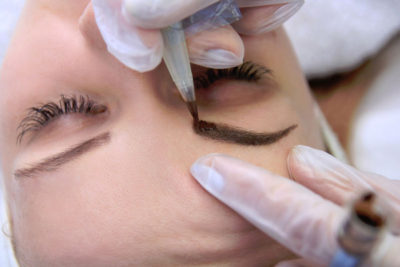The most popular types of permanent makeup for your face involve your eyebrows, lips, cheeks, and your eyelids. Eyebrows are particularly common because hairless eyebrows are all-too-common, your eyebrow hair grows too fast (creating “unibrows,” if left untended), or it’s problematic to need to apply eyebrow makeup daily.
What Is Permanent Makeup?
Permanent makeup is really a series of “cosmetic tattoos.” The process is usually called “micropigmentation.” Proponents of permanent makeup welcome the minimization of the time and hassle of putting on makeup daily to their face.
Those supporting permanent makeup typically want a softer, natural-looking appearance they get from applying and removing daily makeup products.
Many people become permanent makeup aficionados because their facial skin is allergic to various makeup types or participate in active sports activities regularly. They no longer need to worry about their makeup running or “sweating off” as they pursue their sporting activities, whether biking, playing tennis, soccer, or enjoying aerobics.
How Is the Permanent Makeup Process Accomplished?
There are a variety of processes to create permanent makeup, typically dependent on classic tattoo procedures and devices. Among the processes used to affect permanent makeup are the following products and procedures.
- Initial consultation with a permanent makeup specialist;
- Application of the desired pigment via traditional tattoo coil machines, special pens, rotary machines, or digital rotary machines.
- Follow up visits to assess the process success and healing; and
- Analyze the pigment color to see if it needs darkening or lightening.
Is Permanent Makeup Truly Permanent?
Whether you make your eyebrows, eyelids (with eyeliner), lips, or other facial types of permanent makeup (camouflaging scars, beauty marks, imitation hair, or lash enhancement), these are considered permanent. A pigment is tattooed on the top dermal layer of your skin and you cannot wash off the pigment.
However, like other tattoos and pigment infusion, permanent makeup is subject to fading over time and sun exposure. Since this cosmetic process is applied to your face, it may be more prone to fading than other tattoos. You may need to “refresh” your permanent makeup in the future to maintain the color you want.
If you want subtle or dramatic, vibrant colors, you may need refreshing either more sparingly or more frequently than other people. It makes little difference what type of application was initially used to create the type of permanent makeup you want. You can compare the types of cosmetic permanent makeup to tinted hair color or faded colors on deck/patio umbrellas consistently exposed to the sun.
Is Permanent Makeup For You?
Permanent makeup comes in various “flavors” and types. Most of the different types involve the areas you want to be covered and the application method you choose. For example, if you want your lips to be a specific color, one application method may be superior to another based on your natural skin pigmentation.
Your cosmetic professional can advise you the best type of permanent makeup for you. Experienced permanent makeup technicians become knowledgeable about the different types of procedures that generate the most permanence and enhancement.
Complex City Spa is the leading Fort Lauderdale Permanent Makeup Specialist. For a free South Florida Permanent Makeup consultation, CLICK HERE!

